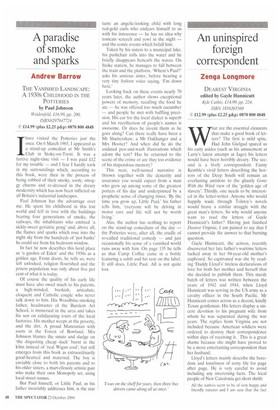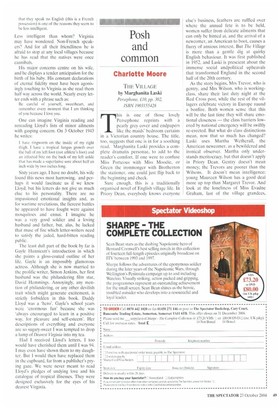An uninspired foreign correspondent
Zenga Longmore
DEAREST VIRGINIA edited by Gayle Hunnicutt Kyle Cathie, £14.99, pp. 224, ISBN 1856265560 (I': £12.99 (plus £2.25 p&p) 0870 800 4848 What are the essential elements that make a good book of letters? The first is mild spite. Had John Gielgud spared us his catty asides (such as his amusement at Larry's latest attempt at Iago) his letters would have been horribly dreary. The second is a lively correspondent. Fanny Kemble's vivid letters describing the horrors of the Deep South will remain an everlasting antidote to the ghastly Gone With the Wind view of the 'golden age of slavery'. Thirdly, one needs to be interested in the letter-writer. Anyone who would happily wade through Tolstoy's novels would brave a similar struggle with the great man's letters. So why would anyone want to read the letters of Gayle Hunnicutt's father? Having just finished Dearest Virginia, I am pained to say that I cannot provide the answer to that burning question.
Gayle Hunnicutt, the actress, recently discovered her late father's wartime letters tucked away in her 94-year-old mother's cupboard. So captivated was she by reading 'Daddy Lloyd's' tireless declarations of love for both her mother and herself that she decided to publish them. This sturdy batch of letters was written between the years of 1942 and 1944, when Lloyd Hunnicutt was serving in the US army as a cavalry officer in the South Pacific, Mr Hunnicutt comes across as a decent, kindly Texan gentleman. His letters display a sincere devotion to his pregnant wife from whom he was separated during the war years. The replies from Virginia are not included because American soldiers were ordered to destroy their correspondence within days of receiving it. This is a great shame because she might have proved to be a more entertaining correspondent than her husband.
Lloyd's letters mainly describe the boredom and loneliness of army life for page after page. He is very careful to avoid including any interesting facts. The local people of New Caledonia get short shrift:
All the natives seem to he of very happy and friendly natures and I am sure that the fact
that they speak no English (this is a French possession) is one of the reasons they seem to be less intelligent.
Less intelligent than whom? Virginia may have wondered. Non-French speakers? And for all their friendliness he is afraid to stop at any local villages because he has read that the natives were once cannibals.
His major concerns centre on his wife, and he displays a tender anticipation for the birth of his baby. His constant declarations of eternal fidelity must have been agonisingly touching to Virginia as she read them half way across the world. Nearly every letter ends with a phrase such as:
Be careful of yourself, sweetheart, and remember every moment that I am thinking of you because I love you.
One can imagine Virginia reading and rereading Lloyd's lists of minor ailments with gasping concern. On 3 October 1943 he writes:
I have ringworm on the inside of my right thigh. I have a tropical fungus growth over the ball of now left foot (not athlete's foot) and an infected bite on the back of my left ankle that has made a superlative sore about half an inch wide by two inches long.
Sixty years ago, I have no doubt, his wife found this news most harrowing, and perhaps it would fascinate us if we knew Lloyd, but his letters do not give us much clue to his personality. There are no impassioned emotional insights and, as for wartime revelations, the fiercest battles he appeared to have fought were against mosquitoes and ennui. I imagine he was a very good soldier and a loving husband and father, but, alas, he lacked that muse of fire which letter-writers need to satisfy the jaded, hard-bitten reading public.
The least dull part of the book by far is Gayle Hunnicutt's introduction in which she paints a gloss-coated outline of her life. Gayle is an impossibly glamorous actress. Although she is now married to the prolific writer, Simon Jenkins, her first husband was the philandering film star, David Hemmings, Annoyingly, any mention of philandering, or any other devilish trait which might generate excitement, is strictly forbidden in this book. Daddy Lloyd was a 'hero'. Gayle's school years were 'enormous fun' because she was 'always encouraged to learn in a positive way, for pleasure and self-esteem'. Her descriptions of everything and everyone are so sugary-sweet I was tempted to drop a lump of Dearest Virgirga into my tea.
Had I received Lloyd's letters, I too would have cherished them until I was 94. I may even have shown them to my daughter. But I would then have replaced them in the cupboard, far from a publisher's prying gaze. We were never meant to read Lloyd's pledges of undying love and his catalogue of tropical illnesses. They were designed exclusively for the eyes of his dearest Virginia.

























































































 Previous page
Previous page